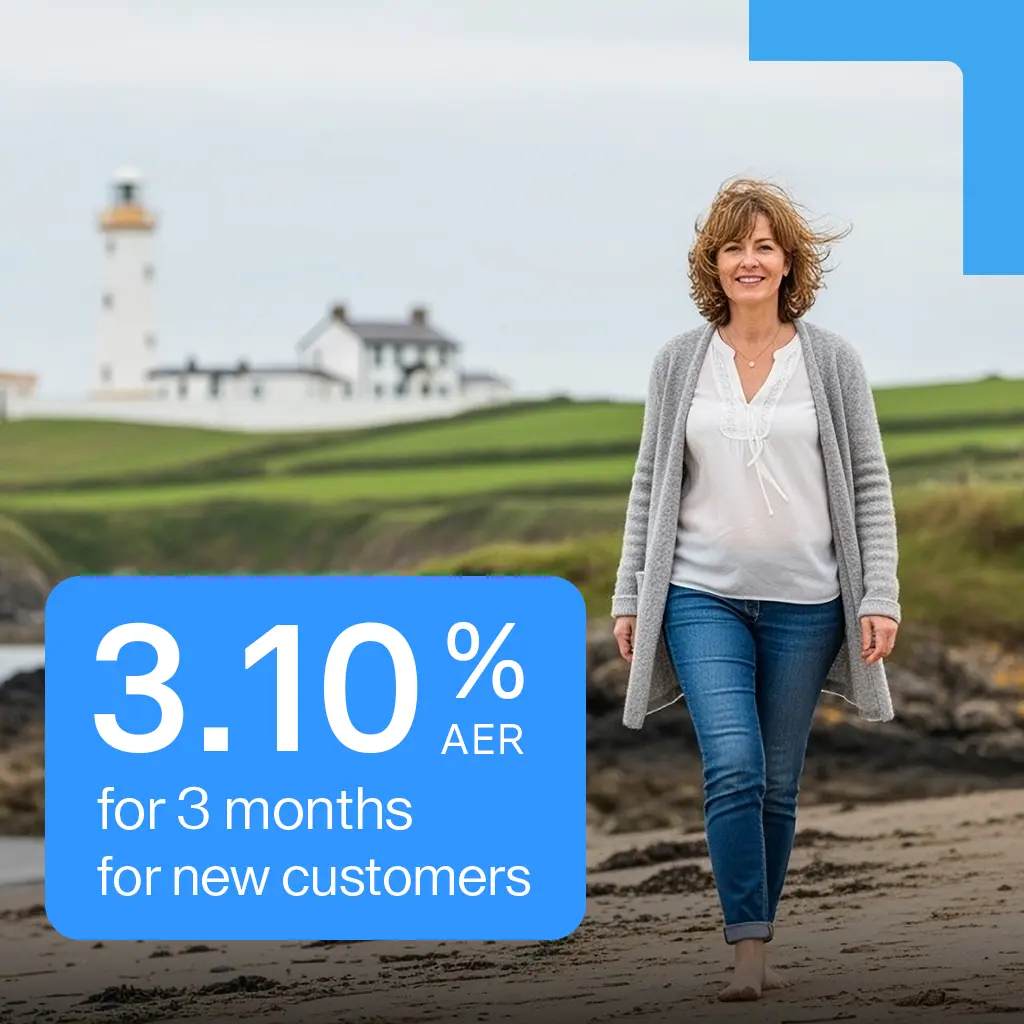Where should I invest or save my money in Ireland?
Explore popular investment opportunities in Ireland, including stocks, funds, pensions, state savings, and more.

If you’ve been saving for some time, or have a lump sum you want to invest but aren’t sure where or how, read on to learn why it might be worth considering investing your money, the most popular ways to invest in Ireland, and why you might need an emergency fund that you can always access easily.
Key takeaways
Investing money in Ireland doesn't guarantee returns
Deciding where to invest money will depend on your financial situation and what you want to achieve with your investment
This is useful for unforeseen expenses, and can help prevent you needing to access the funds you have invested
The information provided here is for informational and educational purposes only and does not constitute financial advice. Please consult with a licensed financial adviser or professional before making any financial decisions. Your financial situation is unique, and the information provided may not be suitable for your specific circumstances. We are not liable for any financial decisions or actions you take based on this information.
Why do I need to invest my money?
The main reasons to invest your money are for long-term financial security and to build your wealth. Some investors opt to invest their money with the hope of generating a return that beats inflation in Ireland.
If you’re considering where to invest your money, it’s important to know what your goals are first, so you can choose the best place to save money for you.
You never know what’s around the corner, so if you do decide to begin investing in Ireland it’s important to have first paid off any debt, built up a 3-6 month emergency pot, and have made pension provisions so you can enjoy your retirement.
What should I consider when deciding where to invest money?
There’s no one-size-fits-all approach when it comes to investing in Ireland, nor is there a “best way” to invest your money. There are a few things to consider.
Your financial situation
How you invest will depend on how much you have coming in each month and how much of that goes towards expenses or paying off debt. You’ll also want to think about what savings (including for emergencies) you have. Using a budget planner can help ensure you’re starting with a strong financial foundation before committing your funds.
Your investment goals
What are your financial goals, both in the short and long term? Whether you’re putting money aside to buy a home in Ireland or building your retirement nest egg, your goals will help you decide where to invest money and for how long.
Your investment horizon
Think about how long you can leave your money untouched. Investors with a shorter time to reach their goals may take on less risk than those with a more flexible timeframe to see out any volatility in the markets.
Your risk tolerance
One of the most important things to consider before you start investing is risk. Investing money doesn’t provide guaranteed returns, so it’s important to understand the risk involved (that you might lose money) and, equally importantly, to understand the amount of risk you’re comfortable taking, to try and maximise returns on your investments. Investing isn’t for everyone, especially if you’re more risk-averse, as no matter where you invest your money, it’s subject to unpredictable rises and falls.
Safer alternatives
If you’re uncomfortable with the thought of potentially making losses, there are other places to invest your money without taking such a big risk, such as traditional savings accounts.
Whether you choose to invest your money or save, it’s important to avoid entering into an agreement for a financial product that you don’t understand. There is plenty of information online for 'investing for beginners', but it’s often worth consulting an independent financial adviser regulated by the Central Bank of Ireland or conducting thorough research before you commit to a particular investment option or savings account, as it’s important that you fully understand the individual terms of the product you’re considering and the risks involved.

Raisin Starter Account
Put your cash to work with a secure, high-yield savings account. Open in minutes, deposit from €1, and earn a fixed 3.10% AER over 3 months. Enjoy full flexibility to add or withdraw funds at any time, with no fees. At the end of the term, you can seamlessly move your balance to another competitive offer through Raisin. All deposits are protected up to €100,000 per person, per bank under the German Deposit Guarantee Scheme.
What are the best ways to invest my money in Ireland?
As we’ve mentioned, there’s no “best way” when it comes to investing in Ireland, as it’s down to your personal needs, your own appetite for risk, and your reasons for investing, but some of the most popular ways to invest money in Ireland are the following:
Stocks and shares
While savings accounts might be considered the best place to save money without risk in Ireland, investing in stocks and shares can give you a better return on investment if you’re prepared to take a risk and have a long-term approach. Investing in stocks and shares can be volatile and unpredictable, and may be better suited to experienced investors. It’s also worth noting that this investment option comes with fees, and any gains you make may be subject to capital gains tax (CGT) when it comes to selling.
Investment funds
If you prefer not to put all your eggs in one basket, you might consider investment funds, including mutual funds, which are commonly offered by insurance firms. Here, money from several investors is pooled and invested in a mix of stocks, bonds, and more. Investment funds can be a popular choice for more conservative investors who still want exposure to the markets but don’t want to manage individual stocks themselves.
Savings accounts
There are many different types of savings accounts to consider, and they’re generally low-risk investments. What’s more, you’re not limited to saving with Irish banks; marketplaces such as Raisin offer options beyond Ireland for Irish savers. You can choose from:
- Demand deposit accounts, offering near-instant access to your money.
- Fixed term deposit accounts, where you put away a lump sum of money for a set time at a rate that won’t change until your account matures. Because you get a guaranteed return, this can be a good option in times of uncertainty and falling interest rates.
State savings
Because they are backed by the Irish government, state savings options are considered among the most secure ways to invest money in Ireland. You can invest in:
- Savings Bonds
- Savings Certificates
- Prize Bonds
Any returns made are tax-free, making them particularly attractive for investors looking to keep more of their earnings.
Children’s savings accounts
Children’s savings accounts are investments you can make on behalf of your children to put them on the path to financial security, while helping them understand how to save and why it’s important. This type of savings account typically offers more competitive interest rates than adult savings accounts, so they can be a great investment in your child’s future.
Pensions
Investing into a pension might be a good way to ensure you’re comfortable in retirement. You might already have a workplace pension, but you could also consider a Personal Retirement Savings Account (PRSA). PRSAs can be self-directed, giving you a wider range of investment options, including stocks, bonds, and exchange-traded funds (ETFs).
Peer-to-peer lending
Peer-to-peer lending means you’ll invest your money into an Irish business or project that needs capital to grow. You may be able to earn more than you would with traditional savings, but there’s no guarantee you’ll get your money back if the borrower can’t repay the loan.
Emergency fund
While it might not be the first priority when deciding where to invest money in Ireland, an emergency fund can be an important safety net in the event of any unforeseen expenses. Having an emergency fund to fall back on might prove critical if you’re considering high-risk investments, where it’s possible you’ll lose money.
Experts usually recommend putting aside three to six months’ worth of expenses in emergency savings. And to make sure it’s within easy reach but still separate from the account you use for everyday spending, you might consider placing your fund in a demand deposit account.
How to invest €10k in Ireland
Investing €10,000 can be approached in various ways, depending on how comfortable you are with risk, your financial goals, and whether you're thinking long or short-term (although investments by their nature should typically be approached with a long-term mindset). If you've paid off any debt and have built up a 3-6 month savings buffer, you could then consider investing your €10k into options such as stocks and shares, Real Estate Investment Trusts (REITs), and Government Bonds. You could also consider enhancing your pension pot or adding this money to a high-interest savings account.
Best place to invest €10k in Ireland
There is no 'best' place to invest €10,000 in Ireland, as this depends on your individual financial goals, risk tolerance, and time horizon. The most popular and potentially rewarding investment options across various risk levels:
- High risk options include ETFs, stocks, peer to peer lending, cryptocurrency
- Medium risk options include property investment mutual funds, and REITs
- Low risk options include savings accounts, Government bonds, and retirement savings
Apply for savings accounts with Raisin
Although Raisin does not offer investment options, you can open savings accounts from our partner banks through our marketplace today. All partner banks are covered by the statutory deposit guarantee scheme in their country of origin, protecting your funds up to €100,000 per person, per bank, should the bank fail.
You first need to open a Raisin Account, then apply for a savings account and transfer your funds.
Company & team
Savings accounts
Information
Company & team
Savings accounts
Information
© 2026 Raisin Bank AG, Frankfurt a.M.
All interest rates displayed are Annual Equivalent Rates (AER), unless otherwise explicitly indicated. The AER illustrates what the interest rate would be if interest was paid and compounded once a year. This allows individuals to compare more easily what return they can expect from their savings over time. Raisin Bank, trading as Raisin, is authorised/licensed or registered by BaFin (Bundesanstalt für Finanzdienstleistungsaufsicht) in Germany and is regulated by the Central Bank of Ireland for conduct of business rules.